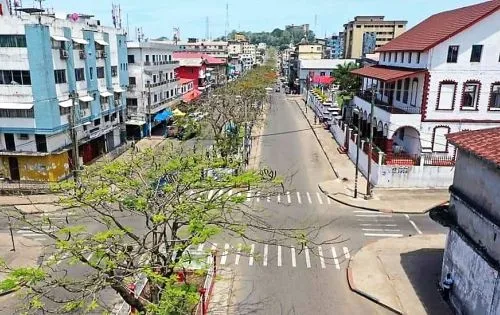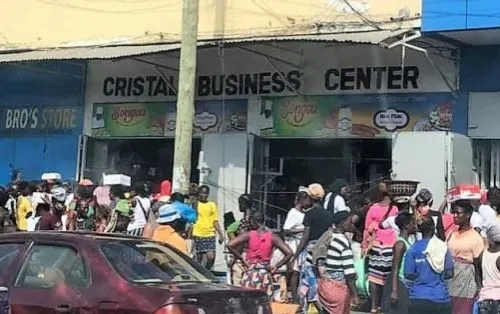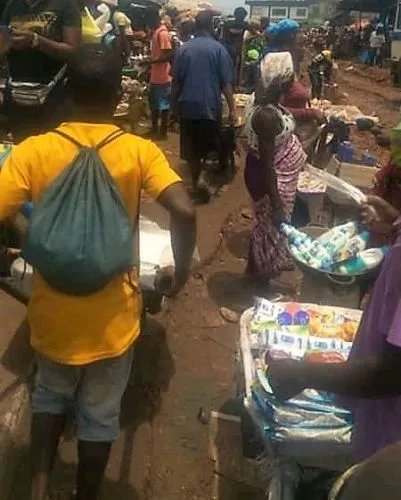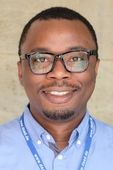The urban poor in Monrovia, Liberia: How to embed the response to COVID-19 into a "riskscape" scenario
Blog post by Phillip Garjay Innis*)
Liberia is still reeling from the impacts of the 2014 West African Ebola epidemic. In addition to human losses, the knock-on effects were devastating. International responses to the outbreak, such as travel restrictions on Liberia stymied post-war economic resuscitation, while domestic responses such as the violently imposed quarantine of slum communities, had disastrous consequences for the urban poor. It is expected that the repercussions of the responses to the COVID-19 outbreak, including the lockdowns, will continue to reverberate in the foreseeable future. But not everyone will be equally affected. Poor communities are expected to be the hit worst.
Swift Response, but fragile health system
Building on its experience with the Ebola crisis, Liberia was one of the first countries in West Africa to institute measures such as airport screening, isolation of travelers from China, and providing for hand-washing services in public areas as early as January 2020. Subsequent measures culminated in the declaration of a State of Emergency on April 11 with restrictions on movement and complete lockdowns in designated counties. Despite these early measures, the public health system remains fragile. The country is reported to have between one single up to six ventilators while carrying out widespread testing remains a challenge. Diseases like malaria, tuberculosis, and Lassa fever are still prevalent and there are concerns that COVID-19 could erode the fight against these ‘neglected’ diseases.

Stigmatization and rumors
A key concern is the stigmatization of people who have contracted COVID-19. There is already a reported case of a COVID-19 patient going into hiding. This is reminiscent of the Ebola outbreak where stigma remained high among survivors even a year after recovery. Furthermore, there is the ongoing controversy on whether to publish the names of people who have tested positive for COVID-19 in order to enhance contact tracing. However, there are many who oppose this idea citing a breach in privacy issues and stigmatization.
And then there are the conspiracy theories, suspicions, misinformation, and disinformation regarding the source, scale, treatment, and other aspects of COVID-19. This situation can have far-reaching consequences. In 2014, after vandalizing the Ebola treatment center in West Point, a slum community in in Liberia’s capital Monrovia, several of the patients were reported “missing” the days after. This was described as the greatest setback to the Ebola response. A few days ago, residents of Abidjan, in neighboring Cote d’Ivoire, destroyed a coronavirus center due to suspicions that the center could contaminate their community.
Social distancing in informal settlements
With regard to reports about social distancing not being observed in some parts of Monrovia, the question remains how social distancing can be implemented in the city’s congested slums?
Slum inhabitants in Monrovia must leave their homes every day for access to basic public services such as the collection of water or the use of public latrines. In West Point, one of Monrovia’s oldest slums, private individuals run ‘hanging toilets’ that residents can use due to lack of toilets in private homes. In 2009, this community was reported to have only four public toilets serving a population of 70,000. Practices such as regular handwashing with soap and running water are difficult to implement due to the lack of potable water. Furthermore, the high population density makes social distancing and self-isolation practically impossible. Precarious livelihoods mean people do not have the financial wherewithal to cope during a lockdown. Many of those working in the informal economy have to earn cash on a day-by-day basis. They do so by selling in markets or hawking so they can buy food for their families. Incomes are low, there are no social safety nets, and savings are practically non-existent. Taking time off “work’ is not an option. A lockdown leaves this vulnerable population to the miracles of improvisation to survive.

Lessons learnt from Ebola
How has social distancing been enforced in the past? In 2014, Liberia’s government imposed a brutal quarantine of the entire West Point to curtail the spread of the Ebola virus, which resulted in much controversy and turmoil. Tensions led to violent clashes with the military who were firing at protesters. A subsequent inquiry found the army culpable. While the enforcement of the COVID-19 lockdown has not been militarized as the Ebola lockdown was in 2014, the army has been accused of brutalizing people in some cases when enforcing the lockdown.

COVID-19 requires a 'riskscape' approach
An important lesson we can learn from this pandemic is that no risk should be assessed without considering all its spatial dimensions. The risks associated with COVID-19 are transforming spaces, triggering awareness of new risks, and generating new interactions amongst stakeholders. It is important, while investigating the risks associated with COVID-19, to not ignore already existing risks. Thus, it is possible to achieve a comprehensive understanding of the COVID-19 ‘riskscapes’ in developing countries.
Monrovia’s scattered informal settlements are characterized by a lack of planning and entrenched poverty. Moreover, they are situated in hazardous areas that are often inaccessible by roads. Everyday health-related risks result from the precarious location, exposure to hazards such as floods and erosion, lack of safe drinking water and sanitation, as well as poor infrastructure, amongst others. These everyday risks may be deemed small, but the disruptions they cause leave poor people more vulnerable to major threats like COVID-19.
Debates on the suitability of measures taken to curb COVID-19 spread in different territories indicate that the relationship between risk and space is complex. It is therefore important to adopt a more holistic examination of risk that captures ways in which risks are subjectively experienced by sections of society. The concept of ‘riskscape’ offers a lot of options here as it captures the relations between risk, space, time, and practice. The concept proposes investigating different risks within a common framework that accentuates their spatial dimensions, in addition to capturing their fluidity, multiplicity and materiality, as well as the perceptions, knowledge, and imaginations of the actors who experience and shape them.
*) The author is a junior researcher at the Center for Development Research (ZEF) of the University of Bonn


